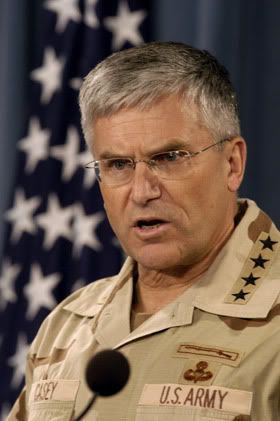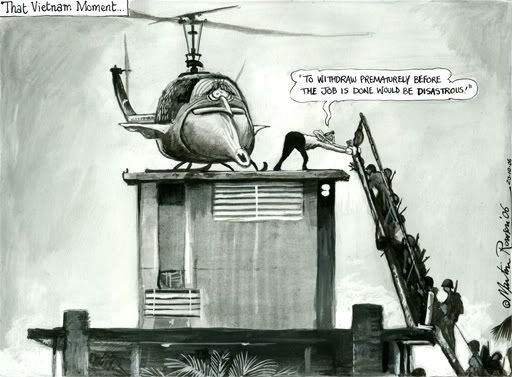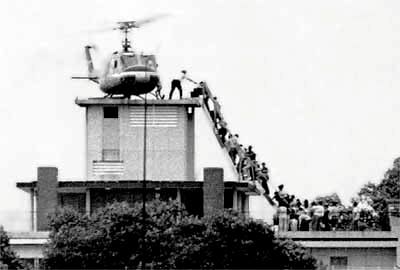NOTE: News Compass will publish a series of articles tracing the build-up of the nuclear crisis in North Korea and the aggressive posture of the US Administration which led to the North Korea regime to push ahead its nuclear weapons ambitions.
From the following speech delivered in March 2003, it becomes apparent that the current Bush Administration's policies on North Korea triggered the North Korean regime to go at all costs for the build up of nuclear weapons.
The warning signs on the dangers of the Bush Administration's attitude to North Korea which would push North Korea further towards the nuclear option were brushed aside by the Bush Administration.
The following article was first posted on Nautilus Institute website on March 23, 2003.
A text of the speech by Desaix Anderson at the Croft Institute of International Studies University of Mississippi Oxford on
20th March 2003.
Read
here full article
Crisis in North Korea:
The U.S. Strategic Future in East Asia
by Desaix Anderson ,
March 20, 2003
The following is text of a speech given on March 20, 2003 by Desaix Anderson at the Croft Institute of International Studies University of Mississippi Oxford.
Anderson asserts that success through bi-lateral negotiations between the United States and North Korea was attainable last fall and might still be attainable if our diplomacy were flexible and deft.
But time has become very short and it may already be too late.
We may now be faced with only two options: catastrophic war or a nuclear-armed North Korea.
Desaix Anderson served for thirty-five year as a Foreign Service Officer, U.S. State Department, working in and on Asian issues, was Principal Deputy Assistant Secretary of State for East Asia and the Pacific (1989-92) and executive director of the Korean Peninsula Energy Development Organization (KEDO) for over three years until April 2001.
With war with Iraq having started, I am uncomfortable discussing candidly another foreign policy crisis, but North Korea is a crisis which cannot wait to be addressed."
North Korea's startling confession last October that Pyongyang had a secret nuclear arms program recalled eerily the dangerous moment in 1994 when war between the United States and the Democratic Peoples Republic of Korea (DPRK) nearly occurred.
Former President Jimmy Carter's talks with Kim Il Sung in June 1994 rescued us from a war that former Defense Secretary Perry said was imminent.
President Carter was able to outline a way out of mutual hostility toward a more normal relationship between the United States and North Korea to end the crisis.
As in 1994, today American and South Korean forces on the DMZ still face roughly 800,000 North Korean military; 11,000 artillery pieces with South Korea's capitol Seoul in range; chemical, biological, and nuclear weapons possibly coming into play; and hundreds of missiles capable of hitting all of South Korea (and much of Japan).
To deny, as an ostrich, that this is a "crisis" ignores the facts. Korea is one of very few places on Earth where the United States might be at war, not by our choice, tonight.
South Korean and American casualties might reach a million persons in the first 24 hours of attack. Wise handling of North Korean policy is imperative and yet dangers grow more urgent by the day.
KEDO
Under the Agreed Framework, concluded by the U.S. and DPRK in October 1994, the Korean Peninsula Energy Development Organization ( KEDO) was established to build two proliferation-resistant nuclear reactors and provide 500,000 metric tons annually of heavy fuel oil in exchange for termination of North Korea's nuclear programs at a place called Yongbyon.
I was Executive Director of KEDO from 1997 until April 2001.
KEDO was the first wedge of attempting to test whether we could collectively deal with this extremely isolated nation, and, for North Korea, it was a test of whether they could deal with the non-communist world.
For Pyongyang, it was an enormous step to adopt a policy premised on friendly coexistence first with the US and then, after Kim Dae Jung's "sunshine" initiative, also with South Korea and Japan.
The 1998 Crisis
When I took over KEDO in late 1997-98, the Agreed Framework verged on collapse. DPRK officials told me, this was because the United States remained hostile to the DPRK and had not lifted economic sanctions or moved forward to normalize relations, as promised in the Agreed Framework.
For its part, the United States was demanding inspections of a suspected nuclear facility under a North Korean mountain at Kumchang-ri. Some in Congress clamored for abrogation of the Agreed Framework; others advocated military action against North Korea.
Under pressure, President Clinton named former defense Secretary William Perry to review North Korea policy.
Secretary Perry consulted extensively with South Korea, Japan, and China, and conferred with many Americans.
Credible willingness of the U.S. to end hostility toward North Korea and build a new constructive relationship, formed the core of former Defense Secretary Perry's conclusions about the dynamic at play with North Korea and the means to overcome this crucial barrier to a new, peaceful Northeast Asia;
Over the next year, Secretary Perry convinced DPRK leadership that Washington was genuinely prepared to end American hostility and to normalize relations with the DPRK.
Pyongyang accepted the "Perry approach."
Subsequently, the United States and DPRK also made major progress on ending the other North Korean threat B long range ballistic missiles.
In tandem, the DPRK was required to honor its commitments, as it took advantage of the opportunities that were available for improved relations
Evolution in North Korea from engagement through the Agreed Framework, KEDO, the Perry process, the North & South Korea Summit in June 2000, US- DPRK dialogue and missile talks raised the hope of ending the fifty-year threat to peace in Northeast Asia, where two of our closest allies, Japan and South Korea, are located.
Although we had witnessed in the past sporadic cases of North Korean efforts to reach out to the international community, this was the first time where all efforts appeared to converge and suggested turning the DPRK from a dangerous wildcard into a less menacing and perhaps more constructive member of the community of Northeast Asia.
The Bush Administration
Against this felicitous background, President Bush abruptly jettisoned the Clinton administration's and Secretary Perry's achievement.
In a stunning press conference following the March 2001 meeting with South Korean President Kim Dae Jung, President Bush publicly called North Korea untrustworthy and Kim Jong Il a dictator, seriously embarrassing and undermining President Kim Dae Jung.
Even more definitively, the President, in effect, abrogated Perry's achievement by including North Korea in the "Axis of Evil."
Pyongyang also concluded that the threat of "pre-emptive nuclear attack," outlined in the U.S. 2002 National Security Strategy of September 2002, was aimed at North Korea.
As a result, Pyongyang feared and fears that North Korea is the next target after Iraq.
Against this backdrop, over the past year, Pyongyang initiated more serious economic reforms and improved relations with all its neighbors -- Russia, China, South Korea, and Japan -- to hedge against possible U.S. attack and to encourage the United States to resume dialogue.
U.S. intelligence agencies decided last summer that the DPRK was developing uranium enrichment facilities, at a separate site from Yongbyon.
Uranium enrichment facilities would violate the Nuclear Non-proliferation Treaty (NPT), the Agreed Framework, and the 1991 North-South Non-Nuclear Agreement.
Despite claiming for over a year to be "prepared to talk anytime, anywhere, without conditions, the U.S. had spurned talks for 22 months until U.S. State Department Assistant Secretary James Kelly's visit last October to Pyongyang.
In fact, Kelly REFUSED to talk, and only demanded that North Korea end its new nuclear activities.
My best guess is that the development of the uranium enrichment facility began in 1997-98 when the Agreed Framework almost collapsed.
I assume that North Korea, in the context of the tenuous commitments of the United States; with its own growing weakness, Pakistan's proposal to pay for missile technology from North Korea with nuclear technology, decided to develop a new nuclear option.
This nuclear project apparently accelerated after President Bush included Pyongyang in the "Axis of Evil."
Caught red-handed, Kim Jong Il decided to manage U.S. allegations by instructing his Vice Foreign Minister to acknowledge the suspected uranium enrichment facilities.
He raised the stakes in an already high stakes negotiation, but he hoped to induce the United States to undertake negotiations of a comprehensive settlement, as the United States itself had raised rhetorically.
This was a risky strategy, at devastating cost to North Korea's credibility, confirming dramatically suspicions that the North Koreans were duplicitous and its actions reprehensible, but, through his candor, Kim hoped to engage the United States.
He probably surmised that the United States was too preoccupied with Al Qaeda and Iraq to attack North Korea at the moment, and that South Korea, Japan, Europe, China, and Russia would, in any case, all urge negotiations, not war.
In deference to its preferred war with Iraq, the Bush Administration downplayed the North Korean threat, but the administration, in reality, fell into a dangerous self-imposed trap:
President Bush declared that the U.S. would pursue diplomatic channels to resolve this problem, but, instead, the administration began pushing Japan, South Korea, China, and Russia to exert economic pressures on North Korea.
The administration announced that it would not submit to "blackmail" or engage North Korea in negotiations to end the threat.
Diplomacy is quintessentially negotiations between two parties with conflicting goals. It is not just coercion, a fact that the administration seems not to understand.
The administration's formula will not achieve the goal the administration and we all seek - ending North Korea's dangerous nuclear activities.
During the 1998 crisis, North Korean Ambassador to the United Nations, Li Hyong Chol, with whom I had a close, candid relationship, emphasized to me that Pyongyang did not react well to ultimatums or to tit for tat proposals.
Pyongyang, he told me, would be much more responsive to proposals for moving forward in tandem to deal with the issues at hand.
Based on my experience, Pyongyang will NOT respond constructively to efforts by the Bush administration to impose sanctions or economic hardships on North Korea.
Moreover, refusal to talk infuriates a Korean since it implies profound disrespect and denial of the existence of the other person.
Crisis Deepens
After the "confession," the U.S. acceptance of North Korea's claims that the U.S. had "nullified" the Agreed Framework was also misguided.
North Koreans repeatedly told me in 1998 that the U.S. had "nullified" the Agreed Framework, but the accusation led to nothing.
Despite North Korea's violation of the Agreed Framework, we should NOT have lightly discarded a mechanism that imposed crucial restraints on Pyongyang.
As a result, the crisis immediately began to deepen:
At U.S. urging, the heavy fuel oil commitments were suspended by KEDO. Inevitably, Pyongyang reacted negatively and in a succession of dangerous moves has now renounced all the elements of the Agreed Framework.
Pyongyang announced that it would restart the five megawatt reactor that can produce enough plutonium each month to build a nuclear weapon.
They threw out the IAEA inspectors and removed the seals on nuclear facilities.
North Korea regained control of 8000 spent fuel rods, stored under the Agreed Framework, enough to fuel five/six more nuclear weapons by this summer.
Although they have apparently not yet crossed the red line President Clinton drew, warning against any reprocessing.
North Korea ended its missile moratorium, test firing two short range missiles into the Sea of Japan.
Four MIG jets recklessly tracked a U.S. reconnaissance plane for twenty minutes two weeks ago.
US-DPRK relations appear to be in free fall.
Despite these ominous moves, Pyongyang has repeatedly announced that North Korea was prepared to negotiate resolution of all the issues of concern to the U.S., including explicitly nuclear issues.
Pyongyang has also shifted from insistence on a US-DPRK Peace Treaty, which the U.S. has rejected, and is now calling for a non-aggression pact between Washington and Pyongyang.
Kim Jong Il has demonstrated repeatedly that his nuclear and missile activities are cards to exchange for elimination of threat he perceives from the U.S.
But I deeply fear that we are rapidly moving beyond the point at which North Korea might be willing to negotiate away its nuclear facilities and may well have decided, in light of the Bush administration's continuing hostility and unwillingness to even talk, that its best protection from the Bush administration is to become a nuclear-armed state.
The hopes of late 2000, thus, have been dashed and we are in the midst of an increasingly dangerous crisis.
The threat from North Korea is far greater now than it was only two years ago.
At the Root Problem in Pyongyang
The underlying cause of the 1994 crisis, the near collapse of the Agreed Framework in 1998, and the current crisis with Pyongyang all stem from the same root cause that the administration seems to ignore.
For ten years, North Korea, cut from support from the Soviet Union and China, has become profoundly insecure about its survival.
The DPRK economy is dysfunctional. South Korea has surpassed the North in virtually every facet of national power.
U.S. military prowess in Afghanistan, the "pre-emptive attack" on Iraq, hostile rhetoric from the Bush administration exacerbate fears in Pyongyang of an American attack.
In each of the three recent crises in US relations with North Korea the scenarios have been virtually identical:
Out of growing weakness, Pyongyang cried out for attention, making increasingly dangerous threats, to try to ensure its security and survival in the post-Cold War world;
The sub-text each time has been North Korea's desire to break from its isolation and establish a non-hostile relationship with the United States, and through the United States to gain access to economic assistance, funds from Japan, the IMF, World Bank, Europe, South Korea, to resuscitate its economy;
Only negotiations explicitly ending hostility and the threat behind it will likely move Pyongyang to relinquish its newly dangerous challenge.
Economic pressure from neighbors may further devastate the North Korean economy, deepen famine, and even lead to collapse of North Korea's economy, but would NOT resolve the basic problem in Pyongyang.
The administration should overcome its puerile distaste for dealing with Kim Jong Il, and urgently engage the North in serious discussions to end North Korea's nuclear programs and deal with the root cause of North Korea's insecurity B the hostility and threat it perceives from the United States.
Currently, the administration's ostensible policy is to try to convince North Korea to join a multilateral conference -- political camouflage to allow discussion of the nuclear issue.
However, North Korea has emphatically rejected any multilateral approach to deal with its nuclear facilities, and insists on dealing only with the United States to manage the threat from the U.S.
It is counter-productive to pursue an approach that has repeatedly been rejected and goads North Korea to ratchet up the pressure recklessly.
There are, of course, other lines being pushed within the administration's inner circles.
Some fantasize that eventually South Korea and China will agree to try to strangle North Korea economically.
This will NOT happen, because neither wishes to induce the economic and societal collapse of North Korea.
Others are advocating sanctions or military strikes against the facilities at Yongbyon. Others mention darkly "regime change."
Pyongyang has declared that sanctions or any military strike would result in all-out war. Such a war would yield grave results in South Korea, and possibly Japan with estimates of a million deaths, including many Americans, a devastated South Korean economy, and millions of North Koreans either dead or seeking survival in South Korea and China.
In my judgment, success through bi-lateral negotiations was attainable last fall and might still be attainable if our diplomacy were flexible and deft.
But time has already become very short and it may already be too late.
We may now be faced with only two options: catastrophic war or a nuclear-armed North Korea.
Almost the only hope would be to send Colin Powell, perhaps accompanied by the first President Bush, urgently to Pyongyang with full powers to negotiate a comprehensive resolution of the key issues, ending North Korea's nuclear and missile threats under intrusive inspections, ending U.S. hostility, security assurances to North Korea, and commitment to move rapidly to normal economic and political relations.
Let us look at the strategic implications of the current Korean crisis.
Korean Anti-Americanism Rising
Rising anti-Americanism in South Korea stems directly from the perception that the U.S. is insensitive to Korean goals, and is attempting to block North-South reconciliation.
Criticism of American arrogance and unilateralism played a crucial role in the fall presidential elections in South Korea.
The result was the narrow, surprise election of human rights lawyer, Roh Moo Hyun, from President Kim Dae Jung's Millennium Party.
Roh favors rapidly expanding engagement with the North. Important to note, young Koreans elected President Roh.
If the United States, preoccupied with Iraq, continues to mishandle the nuclear issues, derails movement toward reconciliation, and perpetuates confrontation between North Korea and the U.S., neither North nor South Koreans will be very forgiving of the U.S.
South Koreans will weigh whether their alliance with the United States is promoting their national goals or whether alliance with China might not serve their national interests more effectively.
Comments by Secretary Rumsfeld two weeks ago that U.S. forces might be withdrawn from their tripwire role on the Korean DMZ or redeployed elsewhere was insensitive, incredibly timed, and only reinforced the Asian perception that the U.S. is indifferent to the feelings and objectives of South Koreans.
We must realize that the U.S. is playing with deep drives, emotions, and historic goals on the Korean Peninsula and should be very, very careful.
The Broader Asian Context
The U.S. handling of Korean issues also has crucial implications in the broader strategic context.
Both China and Japan have profound national security interests at play on the Korean Peninsula.
Clumsy, uncoordinated actions by the U.S. which exacerbate the crisis on the Peninsula will severely damage U.S. relations with China and Japan, as well as the Koreas.
None of the surrounding powers wants a nuclear-armed Korea, North or South. But they also do not want confrontation caused by inept diplomacy from Washington.
China and South Korea are acutely concerned about the collapse of North Korea's economy that could create dangerous instability.
Japan clearly favors peaceful evolution and stability on the Peninsula and would not welcome either collapse or confrontation.
I was in Tokyo when North Korea fired its Taepodong ballistic missile over Japan in August 1998. Japanese were intensely angry at North Korea.
However, many conservatives were also angered by the United States, telling me that Washington had failed to protect Japan, despite the United States-Japan Security Treaty.
If the outcome of this crisis is a nuclear-armed North Korea, the reaction in South Korea and Japan will be harsh and our alliances at risk.
South Korea, Japan, China, and Russia will all blame the U.S. for having refused to talk with Pyongyang, as all of them are urging.
South Korea, Taiwan, and even Japan might re-consider a nuclear option.
Economic Focus
While the United States is uni-dimensionally focused on Iraq, terrorism and the "Axis of Evil," Asia is moving forward WITHOUT the U.S. to build new economic institutions.
The ASEAN plus three (China, Japan, and Korea) and the Northeast Asia annual summits of China, Japan, and Korea, are becoming major instruments for coordinating economic policies and integration and, implicitly, political arrangements for the future.
The ASEAN-China Free Trade Agreement initiated at the ASEAN plus three last October, Japan's proposal for a Japan-ASEAN Free Trade Agreement, also highlight Asians building Asia without US involvement.
The United States, while remaining important, is NOT engaged directly in these emerging institutions of the future. These developments are healthy, but they may not serve America's long term interests or foster a pre-eminent American role in Asia.
With the end of the cold war, Asia is more interested in economic development and integration into the global economy than America's robust and potentially disruptive military policies.
America's Strategic Future in Northeast Asia
The administration's obsession with Iraq, Washington's downplaying and even exacerbating the dangerous crisis on the Korean Peninsula, its indifference and insensitivities to allies and friends in Asia, coupled with lack of focus on profound economic and political evolution in East Asia are seriously challenging and even risking our alliances.
These factors also risk the pre-eminent influence of the United States in East Asia, for which we fought two wars to sustain.
With North Korea, we are dealing with an unusual nation with profoundly different history, perceptions, and ways of negotiating.
If we can hope for success, we cannot demand that they play or negotiate according to our rules.
We must deal with realities, NOT attempt to dictate rules that are meaningless to Pyongyang. There are clear patterns even in the limited history we now have with Pyongyang, but the Bush administration seems determined to ignore what we have learned.
The question in the current crisis is whether the rigidities in the Bush administration's ideological and disdainful approach can prove to have enough flexibility to satisfy North Korea's yearning for security assurances before the fragile links previously established break and we crash into a North Korean implosion or war.
America and its allies' vital national security interests demand that Washington deal urgently and effectively with North Korea. ]
Awaiting disposal of Iraq issues will be irresponsibly and tragically too late to avoid catastrophic war or a nuclear-armed North Korea.






